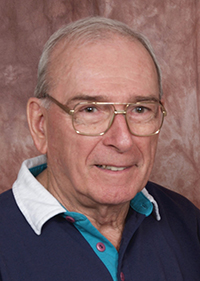 Dr. David Dame, medical entomologist for the Agricultural Research Service, USDA (1961-1988) and independent consultant (1988-2015), was elected ESA Fellow in 2020. Developing methods and products to replace the harsh first-generation organic pesticides of the 1940s and 1950s, he is internationally acclaimed for pursuing environmentally friendly measures for protection from insect-borne disease.
Dr. David Dame, medical entomologist for the Agricultural Research Service, USDA (1961-1988) and independent consultant (1988-2015), was elected ESA Fellow in 2020. Developing methods and products to replace the harsh first-generation organic pesticides of the 1940s and 1950s, he is internationally acclaimed for pursuing environmentally friendly measures for protection from insect-borne disease.
Dame grew up in Greenfield, Massachusetts, attended Deerfield Academy, and received an A.B. degree in zoology-chemistry at Dartmouth College (1954). From 1954 to 1956 he served as a medic in the U.S. Army at Ft. Sill in Lawton, Oklahoma, and Furth (Nurnberg), Germany. With support from the G.I. Bill and a research fellowship, he earned a Ph.D. in entomology in 1961 at the University of Massachusetts (Amherst) under the tutelage of Professor Frank Shaw.
He conducted research and provided leadership for the Mosquito Biology and Control Research Unit, USDA's largest mosquito-oriented research team, based at the Insects Affecting Man and Animals Research Laboratory in Orlando, Florida, and then Gainesville (currently, Center for Medical, Agricultural, and Veterinary Entomology). He conducted studies for industry that led to EPA registrations of several environmentally friendly, public health insecticides, including three new classes of insecticide. He made significant contributions to insect mass-rearing technology and related quality control assessment, assisted IAEA and WHO in developing control methods for arthropod-borne diseases, and provided training and education nationally and internationally for public health-oriented scientists and operational workers.
Dame pioneered the sterile insect technique (SIT) against tsetse flies in then-Rhodesia in a program that was interrupted by civil disruption and therefore relocated to Tanzania, where he supervised the continuation phase as an ARS program leader. Its successful outcome led to IAEA's use of the facilities and methods to eradicate tsetse flies from Zanzibar, preventing further parasite transmission and leading to the African Union's adoption of the technology.
He supervised the rearing and release aspects of science's first successful mosquito SIT program, eliminating the insecticide-resistant malaria vector, Anopheles albimanus, from a village in El Salvador.
During Dame's tenure as research leader (1977-1988), the unit published more than 300 refereed papers on biology, biological control, and chemical control of mosquitoes. He published over 125 refereed papers, including nine book chapters and the "EPA National Training Manual for Public Health Pesticide Applicators."
He was president of the American Mosquito Control Association (AMCA), the Society for Vector Ecology, and the Florida Mosquito Control Association (FMCA); member of ESA, Florida Entomological Society (FES), Phi Kappa Phi, Sigma Xi, Florida Coordinating Council on Mosquito Control, WHO Expert Panel for Parasitic Diseases, FAO Expert Panel on African Sleeping Sickness, Rockefeller Trypanosomiasis Task Force, Gates Foundation Workforce on Malaria, and the WHO Working Group on Development of Public Health Pesticides.
Selected awards include the AMCA Medal of Honor, ESA Distinction in Science, FES Distinction in Research, and FMCA Distinguished Achievements in Public Health.
He is grateful for the long-term assistance and collaboration of many talented individuals and the support received from his wife, Marie, and sons Douglas and Peter during their residence in Africa and throughout his career.
(updated September 2020)
